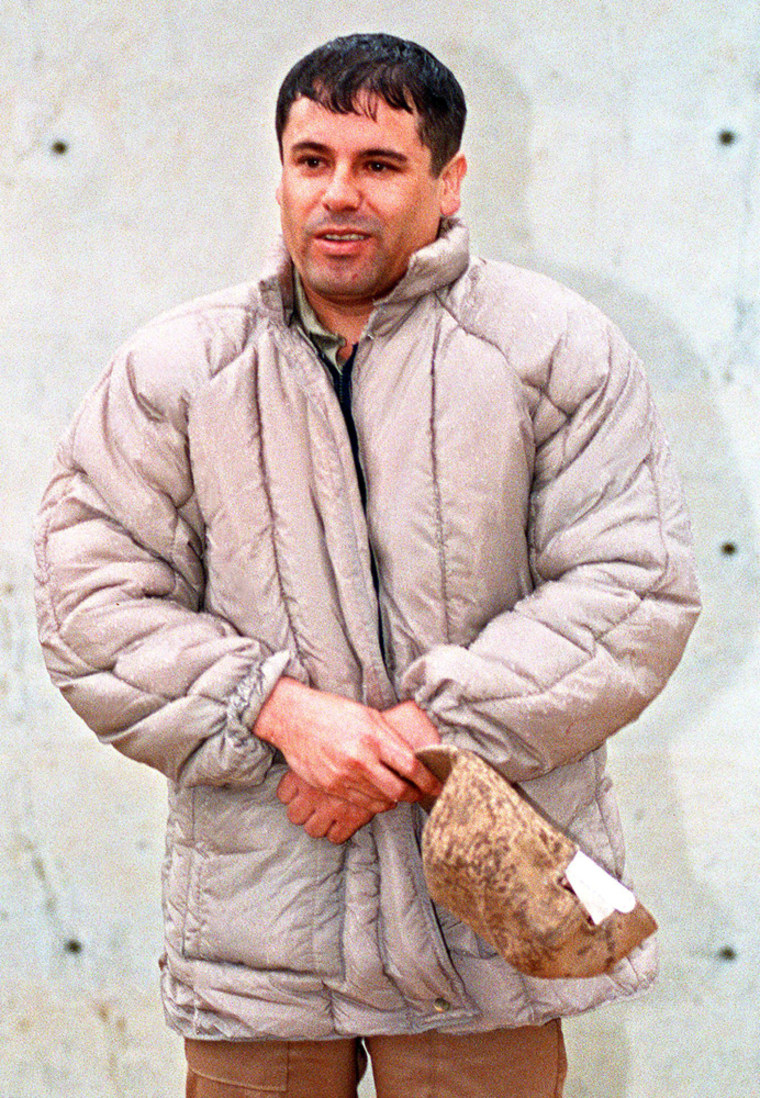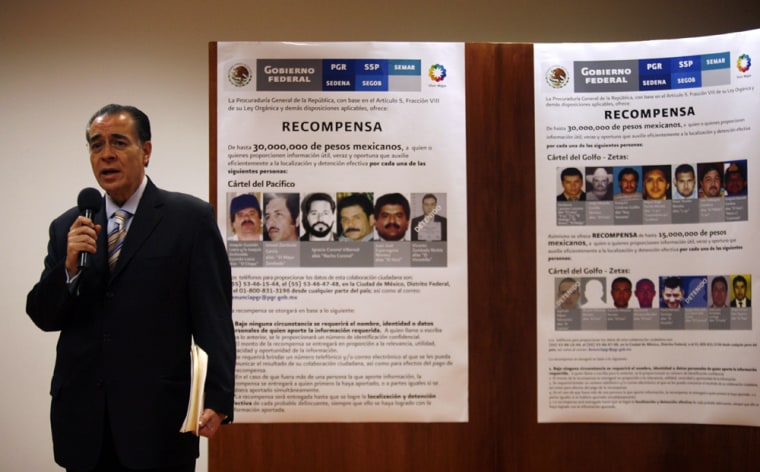Mexico's government on Monday offered $2 million each for information leading to the arrest of 24 top drug lords in a public challenge to the cartels' violent grip on the country.
The list indicated that drug gangs have splintered into six main cartels under pressure from the U.S. and Mexican governments. The two most powerful gangs — the Pacific and Gulf cartels — each suffered fractures that have given rise to new cartels, according to the list published by the Attorney General's Office.
The list offers 30 million pesos ($2 million) in rewards for 24 top members of the cartels and 15 million pesos ($1 million) for 13 of their lieutenants.
Thousands killed in violence
Mexico's drug violence has killed more than 9,000 people since President Felipe Calderon took office in December 2006 as gangs battle each other for territory and fight off a government crackdown. Some of that violence is spilling over into the United States, especially the Southwest, where kidnaps and killings are on the rise.
The rewards are the largest Mexico has ever offered for top drug lords, said Ricardo Najera, a spokesman for the Attorney General's office. Some of the men, such as suspected Pacific cartel leaders Joaquin Guzman and Ismael Zambada, are targeted by separate $5 million reward offers from the U.S. government.
The new list appeared to be the first offering rewards for all the most-wanted cartel members at once. The government could be trying to signal its determination to take on the cartels at the same time, rather than one or two at a time as past administrations have done, said Andrew Selee, director of the Wilson Center's Mexico Institute.
"It tells you a little bit about Calderon's thinking," Selee said. "He really sees this as something he wants to eradicate. He's willing to take them all on as a unit."
Insight into cartels
The document offered insight into the reorganization of the cartels more than two years into Calderon's military crackdown against them.
The Beltran Leyva and Carrillo Fuentes gangs — once considered affiliated with the Sinaloa group under the Pacific cartel alliance — were listed as their own cartels. So was La Familia, which operates in central Mexico and was once considered a gang that answered to the Gulf cartel.

Calderon's government has attributed fractures in the cartels to the military crackdown, saying the arrest of drug kingpins has set off internal battles for control that have led to Mexico's sharp surge in violence. It dismisses suggestions by some U.S. officials that Mexico is losing control of some of its territory.
The list sends a message that Mexico is using all it resources to root out drug traffickers days before a visit from U.S. Secretary of State Hillary Clinton and a month before President Barack Obama visits, said George Grayson, a Mexico expert at the College of William & Mary in Virginia.
Mexican officials "have been quite defensive about all the talk about Mexico's being a failed state and that the cartels are controlling more and more territory," Grayson said. "I see this as an acceleration of Calderon's policy but with one eye on the upcoming visit of the American leaders."
Monetary rewards not big incentive
However, monetary rewards have not proved crucial to the capture of Mexican drug lords in recent years. Calderon's government has not granted rewards for any of the kingpins arrested on its watch, Najera said.
Stephen Meiners, a Latin America analyst for the U.S. intelligence service Stratfor, said many arrests are likely based on anonymous tips from cartel leaders trying to get rid of rivals.
"So far that's been enough incentive to phone in these tips," Meiners said. "I kind of doubt that the people making these calls would want to come forward to claim reward money."
Two of the people named were captured last week: Vicente Zambada, the son of Ismael Zambada, and Sigifredo Najera Talamantes, an alleged Gulf cartel hit man suspected of organizing an attack on the U.S. consulate in Monterrey.
No reward money was granted for either capture, said Najera, the spokesman for the Attorney General's office. Zambada's arrest was the result of an anonymous tip that only alerted authorities to the presence of armed men at a certain location, he said. Najera Talamantes's arrest was not based on outside information.
